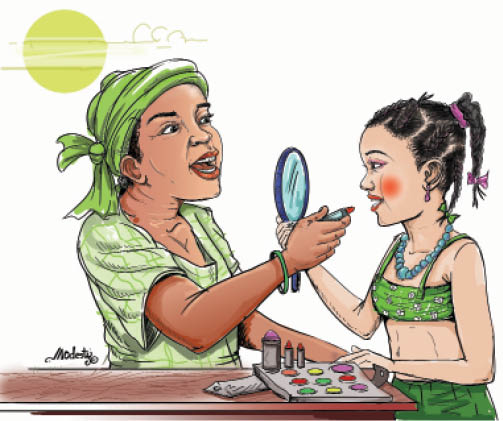Living a healthy lifestyle such as eating right and exercising, avoiding using wrong things on the skin and imbibing personal hygiene such as hand washing have been identified as some helpful ways of keeping the skin healthy. Another way is to visit the hospital when one has skin problems, experts have said.
Dr. Grace Chita Okudo, a dermatologist told Daily Trust that using approaches such as skin bleaching and relying on what relatives or other people say or do creates more problems than solutions for the skin.
She said people should not use things that remove the natural protection of their skin.
She said: “Trying to remove the outer layer to look lighter is detrimental to health, because God has gathered black people to this side because of the effect of the sun. People should imbibe general personal hygiene and environmental hygiene. Hand washing is very key. And rather than saying my sister did this or my brother did that, go to a general medical practitioner, who will look at the skin and refer you to a dermatologist.
“People should go to the hospital when they have any skin or general health problem. A lot of self-medication is going on in Nigeria. Even those who are not eating well want to bleach their skin. Avoid using the wrong things on your body, eat right and exercise, and live a healthy lifestyle. These things can help you live healthy and make your skin to glow,” she advised.
Dr. Okudo who is also the National President of the Nigerian Association of Dermatologists (NAD) said there was need for relevant government agencies such as NAFDAC to ban the sale of skin bleaching products the same way codeine was banned, adding that it is not just about banning but also implementing the ban.
Also, Dr Perpetual Ibekwe, a consultant dermatologist at the University of Abuja Teaching Hospital raised alarm about the increasing number of untrained persons making and selling creams online. She advised the public to be wary of them.
She also called on relevant agencies to clamp down on shops selling steroids as cosmetics in the markets in the country.
“We have noticed the proliferation of steroid creams in markets. For instance If you go to Wuse market in Abuja now, you will find high potent steroid creams being sold in shops, which should not be because steroids are drugs. They should be sold by pharmacists not shops.
“You will even observe that ‘Steroids’ are clearly written on the packets yet are sold in shops as cosmetics. People buy them and they have a lot of negative implications on their health. The regulators should go round the markets,” she said.
On the consequences of such use of steroids, she said it makes the skin weak and feel like cigarette paper, and that one could get injured and also get infections very easily.
She said fungi infections look funny on skin they has been bleached with steroids and that steroids also cause hypertension, psychosis, depress the adrenals, and affect every part of the body.
“People may use steroids for years and in the end when they fall sick, they won’t know what the problem is, or the source of the illness,” she cautioned.
On the problem of many people not being able to distinguish a dermatologist from those selling cosmetics and beauty products, Dr Ibekwe said for a person to be a dermatologist, he or she has to be a medical doctor.
“So you would have gone through the process of six years of medical school, after that you go through another six years of specialist training in dermatology,” she explained.
According to Dr Ibekwe, the first way to differentiate, is to find out if the person is a medical doctor, “if the person is not a medical doctor you can be sure he or she is not a dermatologist.
“We also have a website where we have a list of dermatologists that are members that we know we can refer people to. The third thing is that a dermatologist is an all-rounder, not just skin care.”
She said dermatology has many aspects and not just about skin bleaching as some people think.
“We have cosmetic dermatology, laser dermatology, and clinical dermatology among others. Dermatology is a wide field,” Dr Ibekwe added.
She said bleaching itself is a serious problem and that dermatologists are trying to increase sensitization, by giving alternatives to persons. However, she added that dermatologists may help bleach the skins of some people who for health reasons may require to bleach their skins, such as those who suffer from skin pigmentation, adding that what dermatologists are against is complete change of skin colour from head to toe.
She advised people to be watchful of the kind of creams and treatment they use on their skin through buying known brands of creams with ingredients clearly written, and to avoid the practice of mixing creams in the market with no known source or trace.
She said Nigeria has less than 90 dermatologists and called on government to equip hospitals so that more dermatologists can be trained.

 Join Daily Trust WhatsApp Community For Quick Access To News and Happenings Around You.
Join Daily Trust WhatsApp Community For Quick Access To News and Happenings Around You.


